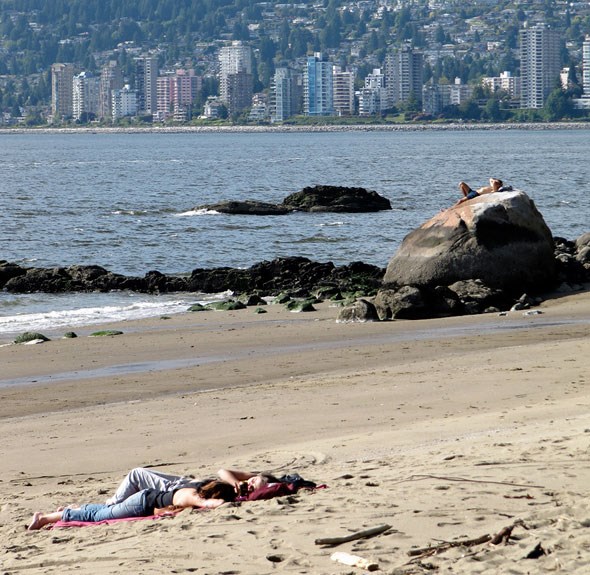Words and photo: Erin Ashenhurst -

I write to you about a problem that threatens ã more with each passing day ã to burden the minds of the local populace with terribly salty, sun-drenched distraction: the problem of the beach.
It is around this time of the year when shops begin to flaunt what can only responsibly be considered summer stock: sundresses, flip-flops, short shorts. For months to come, these enticing items might only be donned under layers of flannel and Gore-Tex, and yet, with the appearance of luminous mirages of spaghetti-strapped tank tops in window displays on grey mornings, the passerby is cruelly reminded of the existence of that mythical ôÕѿǨû§Æ°£Ùsite: the beach.
As the rainforest swells with excessive hydration, whispers of summer seasides enter the collective imagination and form themselves into frivolous commentary. People start saying things like, ãI canãt wait for beach weather.ã For many, this concept of beach-weather is a vital component facilitating the very reality of the beach. Without it, the silt exists only for frenzied dogs, rubber-booted tots, social and antisocial drinkers, scavengers (quadruped, bipedal and those in-between), shrieking seagull gang fights, or contemplative Instagramming. At the first sign of reasonable temperatures, ghosts of days spent at the beach drift through Monday afternoons like glimpses of a foggy Brigadoon.
ôÕѿǨû§Æ°£Ùboasts an eclectic selection of beaches to accommodate anyone seeking dusky sands and a decent view of freighters. There are the Oãs: Jericho, Kitsilano, and Locarno; the languages: English Bay and Spanish Banks; the numbers: Second and Third; and the romantics: Sunset and Wreck (although the latter is less associated with the lyric-lending tragedy of shipwrecks, than the limerick-lending tragedy of wrecking oneãs optionally-clothed body through the ingestion of intoxicating baked goods with a very long, steep staircase acting as the only means of escape).
There are differences, reasons the beaches own separate names. A stray child may require perpetual ãearmuffsã in the company of Third beach-goers, while hipster apathy is trampled in Kitsilanoãs beefy tableau. The briefest surveillance reveals the localsã interest in matching their sense of identity to an appropriate beach, as bodies endeavor to assemble themselves in compatible combinations like conceiving the seating plan of a wedding. Whatever the choice, with the presence of beach-weather, each of these strips of land become pitted with dense groupings of eager individuals hoping to live out a sandy fantasy months in construction.
Like the moon-bound waves, there is an inevitable rhythm to a day at the beach. First contact of feet to sand begins the hunt for an appealing plot ã perhaps a log, a pleasing view of skin, a niche where an open beer or unleashed dog may go unnoticed. Once situated, there are adjustments to garments, halfhearted applications of creams and sprays, acquisition of edibles and reading materials. Then, there is Nothing. Nothing to be accomplished but stare out to the blinding sparkle of ocean, paw oneãs companion, stick sand to sunscreen, litter, blister, select seashells, mark terrain with holes and mounds all exhibiting a pathetic understanding of engineering when contrasted with the works of ãsimplerã animals. Perhaps an intermission to a muddied washroom, port-a-potty or shaggy hillside?
For hours, there is Nothing. There is nothing but to drowse in dreamy immersion, in the intriguing stimuli of strangers sharing close quarters. There is the outside chatter, the slippage in and out of exterior exchanges, judging some alien and some akin; dark glasses and the contemplation of questionable tattoos and mysterious scars on foreign flesh. Baking like a muffin in a heat of contentment, there is the pleasant lose of oneãs stream of consciousness in the crowd and the shining movement of waves and the delicate sensation that everything is good, just now. For a short while, there is bliss ã or something much like it.
Suspended in the sun, and sweat, and discomfort and euphoria, you barely realize you have made a terrible mistake. Drinks run dry and sand grates in the creases. The sun sets and voices waver. An evening breeze still offset by the fevers of sunstroke, and before rolling your belonging into a sandy ball, you remember to acknowledge how wonderful the day was, how wonderful to be at the beach. But this is delirium, because you have only made it worse. As the burn lines fade, and the cold rinses over the West Coast once again, you recognize you have in fact fed the phantoms. Patched by new memories that bulge and boil with promise in the months to come, you will continue to be burdened by thoughts of that fluid state, that fair-weather friend, that fever, that plague, that problem of the beach.


